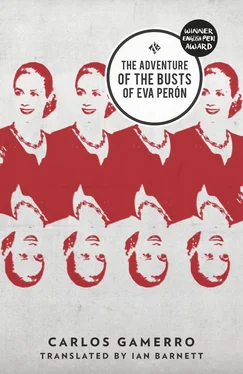‘This factory has been occupied by its workers, Sr Sansimón. From this moment on all the management shall remain on the premises as hostages,’ reeled off a slim fifty-year-old wearing a white helmet. The white helmet on the head of a worker spoke for itself: power had quite obviously changed hands. Marroné had a sinking feeling in the pit of his stomach: a mute disappointment, tinged less with surprise than the confirmation of a basic unhinging between himself and the world. Things had been going too well.
Sansimón hit the red button on the intercom.
‘Security!’
‘Here they are.’
The wall of workers parted just enough to reveal the three security guards, from whose belts, relieved of their heavy burden of truncheons and guns, empty clips hung inert.
‘They was too quick for us, boss,’ said the oldest guard, a fat, moustachioed man who had every appearance of a retired policeman. ‘There was nothing we could do.’
In a gesture more desperate than prudent, Sansimón’s right hand scuttled crab-like towards his left armpit, and Marroné spun round in his chair to see all seven strikers, with almost tactful synchronisation, open their jackets to display an array of automatics and revolvers, some of which had no doubt been seized from the guards. In an instant — the one when it dawned on him he was sitting right in the line of fire — Marroné saw his whole life flash, film-like, before his eyes. He saw himself standing at the centre of a shameful pool of pee in the house of the little girl next door (his earliest memory?); he saw himself fleeing down dark corridors from the Paraguayan maid who was lashing him with a wet floor cloth; he saw the exasperated face of his kindergarten teacher telling him his mother would never come to pick him up if he didn’t stop crying; he could feel the goosebumps on his shorts-clad legs during winter break-times at St Andrew’s and in his chest the anguish of only winning the bronze medal for reciting a poem that opened Up into the cherry tree, Who should climb but little me? ; he relived the humiliation of drowning in the school swimming pool and being saved by Mr Trollope, who had to dive in fully clothed; his father’s exasperated reproach when his gun went off accidentally at the Federal Shooting Range ricocheted again around his empty skull (‘You’re no use even at this’); again he felt his soul empty from his body with his first premature ejaculation, again he saw the whore’s look of sadistic scorn as she made him wipe up the juvenile dribble that would soon be a river of humiliation, swollen by all the subsequent premature discharges until dammed up by a ministering angel, who immediately reappeared in a bridal dress, standing beside a wedding-cake figurine that bore his face; again he whirled through the vortex of blood and other substances he never imagined could issue from a wife, only to wake up on a stretcher, to the news that his son had been born with the correct number of fingers and chromosomes; he saw himself back in his apartment on the Stanford campus, trying to concentrate on Blake & Mouton, while through the wall came the exasperated cries of his child and through the window the moans of teenagers who appeared to attend college for the sole purpose of humping in the grounds night and day; he saw himself back in San Francisco for a brief visit that culminated in a panic-stricken stroll through the gayhippiepsychedelia terrors of Haight-Ashbury; and then straight down the rabbit hole, all the way to that first meeting with Tamerlán in Valhalla, a scene he knew — had always known — would be the last one his eyes would see before they sank into final darkness. All in all it was, he had to admit — and it made him rather sad to bid the world farewell on such a melancholy note — a rather dull movie. Then, just as his mind had begun to articulate the desire for a second chance, to try to live a better, fuller life, his wish was granted: realising the game was up before it began, Sansimón raised his hands and allowed a striker with a blue helmet and acromegalic chin to remove the Smith & Wesson from its holster and hand it to the man in the white helmet. No sooner was Sansimón allowed to put his hands on his desk than he was on the offensive again.
‘You, and you, Trejo,’ he said, ‘have no business here. I’ll report you to the union.’
‘We’re not in the union any more, Sr Sansimón. We were disaffiliated when you fired us,’ retorted Trejo, adjusting his white helmet.
‘For once we understand each other. To go on strike here, you have to work here. But as you don’t work here any more, you can’t go on strike .’
‘The first of our demands is the reinstatement of our dismissed comrades,’ croaked a fat man with a green helmet and several days’ stubble, and with one eye veiled by a milky film.
‘And what else do you want, eh? Executive salaries? A holiday camp with a golf course? Chauffeur-driven limousines to ferry you to work and back? Jacuzzis in the toilets?’ Sansimón gulped in air with each item instead of releasing it; at this rate he was going to burst like a toad.
‘The only thing we want for now, Sr Sansimón, is for you to come with us,’ Trejo said to him.
Whether it was the man’s intimidating laconic tone or because the invitation was accompanied by emphatic waving of the confiscated gun, Sansimón deflated like a fallen soufflé and, with the last wisp of air, his tiny voice wheezed, ‘What… are you going to do to me?’
His fear was understandable. Workers might not have been in the habit of executing their bosses during occupations, but the way the reciprocal violence had been escalating it was only a matter of time before they started. Especially now there seemed to be more subversives infiltrating the factories than actual workers.
‘Take it easy, boss. We’re peace-lovers, we are. If we’ve come to this, it’s only ’cause you gave us no choice. We’re taking you with the others,’ Trejo reassured him.
Meek as a lamb, Sansimón allowed himself to be led outside. He didn’t even look at Marroné as he left. Nor did the strikers pay him any attention. Somewhat offended at everybody’s indifference, Marroné decided to speak up.
‘Errm, excuse me,’ he ventured.
‘Yeah?’
‘What about me?’
The strikers consulted each other with a rapid exchange of glances, and most of them shrugged.
‘You can leave when you like, chief. Only company managers to remain here as hostages,’ the ringleader replied.
‘Yes, but there’s a slight problem,’ said Marroné, smiling, searching for the words with utmost delicacy and tact, as if testing fruit in a supermarket. He remembered an anecdote from How to Win Friends and Influence People about Nelson Rockefeller emerging victorious from a tussle with strikers, but couldn’t recall what tactic he had used or even which of the book’s general principles the anecdote was supposed to illustrate. He’d have given a month’s salary to have it handy. ‘Look, mister striker, I can quite understand the justness of your claims, and I believe we should all fight for our rights, providing, of course, we don’t violate the rights of others…’
‘Get to the point, chief. We’ve an occupation on our hands in case you hadn’t noticed.’
‘That’s exactly my point, because you see I’ve just closed a major deal with the company, I’ve even paid an advance, and if you’re going to halt production, I think it’s only fair that you respect any orders placed before the strike was called, such as mine, for the ninety-two busts of…’
‘Oh, so you’re the one who ordered the busts? You’re the one who demanded our comrades in the workshop do piecework and forced us to bring the occupation forward!’ the ringleader broke in, then immediately issued an order to his lieutenants, ‘This one stays as well.’
Читать дальше











